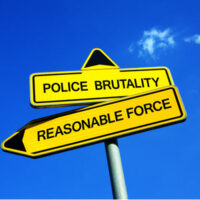When Can You Sue A Police Department For Excessive Force?

Sadly, police brutality and excessive force by law enforcement officers remains a serious problem. A study cited by the Bureau of Justice Statistics (BJS) found that nearly 1 million of the 53 million people who had interactions with law enforcement over a one year period endure excessive force or threats of excessive force.
Police brutality is a civil rights violation. Under federal law 42 US Code § 1983 (Section 1983), a victim of policy abuse can file a lawsuit to get justice, accountability, and compensation.. Here, our Orlando civil rights attorney explains the most important things that you should know about excessive force lawsuits.
Know Your Rights: Police Brutality and Excessive Force
A police brutality and/or excessive force lawsuit in a type of civil rights claim. The Civil Rights Act of 1871 is a federal law that allows individuals to hold police officers and police departments accountable for civil rights violations, including excessive force. You will often hear these types of legal claims referred to simply as Section 1983 lawsuits as a shorthand based on the section of the U.S. code. These are complicated cases: If you are considering filing a Section 1983 police brutality lawsuit in Central Florida, you need an experienced Orlando civil rights attorney on your side.
Requirement: An Act Under the Color of Law
You cannot bring a Section 1983 against a private security guard employed by a property owner—even if the guard is an off-duty police officer. Most likely, that type of abuse is a separate legal claim outside the bounds of civil rights law.
A required element of a Section 1983 police brutality claim is that the defendant(s) must have acted under the color of law. As interpreted by courts, the color of law has been defined as requiring the wrongdoer to have been acting as a representative of the state in some capacity. On-duty law enforcement officers—whether local, state, or federal—are acting under the color of law.
Excessive Force is Defined on a Case-By-Case Basis
One of the core reasons why police brutality civil rights claims are complex is that excessive force is a very fact specific and context specific matter. As defined under the law, excessive force is a level of force that is beyond what the police officer reasonably believes to be necessary to control the situation. All police brutality allegations require a comprehensive investigation by an experienced Florida civil rights attorney.
Get Help From a Police Brutality Civil Rights Lawyer in Florida
At The Baez Law Firm, our Florida civil rights attorney is a fierce advocate for justice. If you or your loved one was a victim of police brutality, we are standing by, more than ready to help you fight for your rights. Call us now or contact us online to set up a completely confidential initial consultation. We have law offices in Orlando and Miami, our civil rights team is well-positioned to handle police brutality and excessive forms throughout the State of Florida.
Source:
bjs.ojp.gov/content/pub/pdf/cpp15.pdf




















